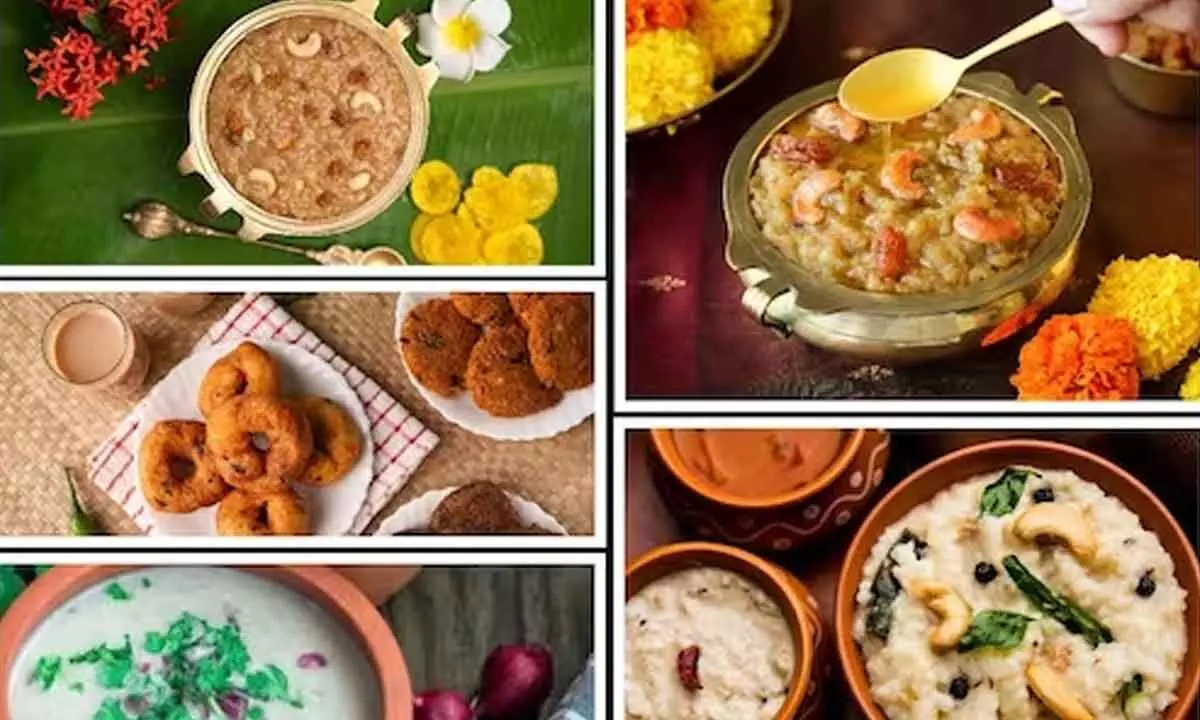Live
- COP29: Scientists, artists, faith leaders call for greater commitment to delivery of climate finance
- Woman donates liver to husband, saves life
- Mechanic Rocky Review: Thrilling Action Film with Twists and Great Performances
- Ponguleti Sudhakar Reddy rubbishes Rahul Gandhi's claims on Modi and Adani
- ‘We can’t take things for granted’: Jayasuriya on balancing formats and Sri Lanka’s path to WTC final
- Prakash Ambedkar ready to 'power' the winner in Maha polls - Mahayuti or MVA
- BJP plans campaign against Cong govt
- Be lifelines to public & render best, cops told
- Siri 2.0: Apple's Advanced AI Assistant to Be Released in 2026
- Senegal ruling party wins parliamentary majority: Provisional results
Just In
Pongal 2024: Vadai to Payasam, 5 Traditional Foods and Their Significance


Pongal, a vibrant and significant Hindu festival, holds a special place in the hearts of the people of Tamil Nadu, particularly in the southern...
Pongal, a vibrant and significant Hindu festival, holds a special place in the hearts of the people of Tamil Nadu, particularly in the southern regions of India. Celebrated over four days in the month of Thai, which corresponds to the 10th month of the Tamil calendar, Pongal is a festival steeped in tradition and spiritual significance. Amidst the various rituals performed during this time, the preparation and consumption of traditional foods play a pivotal role, not only honoring the occasion but also keeping cultural values alive. Let's delve into five traditional Pongal dishes and their rich significance.
1. Ven Pongal: A Symbol of Love and Unity
Ven Pongal, a savoury dish beloved by individuals of all ages, is crafted by simmering rice and moong dal in water and then tempering it with ghee, cumin seeds, and pepper. Often accompanied by sambar and chutney, this dish is a staple in households during Pongal. Symbolising love and unity, it is shared among family and friends, fostering a sense of togetherness. Additionally, it is prepared as prasadam (offering) in temples, distributed to devotees as a divine benediction.
2. Sakkarai Pongal: A Sweet Tradition
Sakkarai Pongal, a dessert made from rice, moong dal, jaggery, and milk, adorned with cashews, raisins, and cardamom powder, is renowned for its rich, sweet flavor and creamy texture. This delectable dish is not only a culinary delight but also forms part of the offerings presented to the gods during Pongal traditions, symbolising sweetness and prosperity.
3. Vadai: Crispy Indulgence and Festival Ceremonies
Vadai, celebrated for its crispy texture and exquisite flavor, is a popular choice for those seeking a hearty snack. Crafted by soaking and grinding lentils like urad dal, chana dal, or moong dal into a fine paste, these are then shaped into patties and fried to perfection. This traditional snack is not only served to visitors and guests but is also offered to deities during festival ceremonies, symbolising hospitality and festive joy.
4. Pongal Payasam: A Symbol of Abundance and Good Luck
Pongal Payasam, a rice, jaggery, and milk-based sweet custard, is revered for its rich, sweet flavor and creamy texture. Cooked in milk and jaggery, enhanced with cardamom powder, and topped with cashews, raisins, and dry fruits, this dish symbolises abundance. Thought to bring good luck and happiness when consumed during Pongal, it is frequently presented to guests, encapsulating the spirit of generosity and auspiciousness.
5. Kambu Koozh: A Nutritious Tradition Dish
Kambu Koozh, a porridge made from Pearl millet, is not only a nutritious and flavourful dish but also a symbol of fortune. High in fiber, iron, and minerals, it serves as a nourishing breakfast alternative, often consumed during the Pongal festival. Reflecting the importance of health and prosperity, Kambu Koozh adds a nutritious touch to the festive celebrations.
As Pongal 2024 unfolds, these traditional dishes continue to play a crucial role in preserving cultural heritage and spreading joy, love, and abundance among families and communities.

© 2024 Hyderabad Media House Limited/The Hans India. All rights reserved. Powered by hocalwire.com






